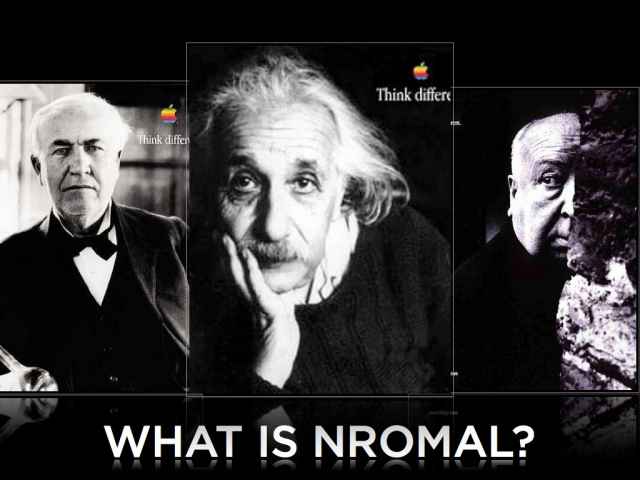(If you’ve been following this series, you know I’m working on building a TED talk about what my son – with a communications disorder – has taught me – a communications professional – about communication. I’m delivering the talk this Saturday at TEDxMU. I’ve been chronicling the presentation process here on The Daily Blur in the hopes that – by watching me deconstruct the process I’ve gone through many times – you’ll begin to look at public speaking with a little less mystique and anxiety.)

Here – in the wake of Steve Jobs’ passing – there’s never been a more important time or place to think different.
We need you more than ever to stop playing Farmville and connect and engage.
We need to do work that makes a difference. We need to ask interesting questions
My son – above all else – asks THE most interesting questions.
- “Do you think I will be very good at avoiding lasers?”
- “Should I use wood or steel to build the roller coaster in the backyard?”
- “Is Dora non-fiction?”
Questions that fit outside – way outside – the norms of typical thinking. Of typical schooling. Of typical standardized testing.
As a result, people like Will tend to get marginalized. The crazy ones. Round pegs. Square holes. You know the type.
I tell you this:
If thinking like this is atypical. I don’t wanna be typical.
Here are a couple more interesting questions for you:
“Why is it everybody wants their children to be typical but no one wants them to be average?” – Roy H. Williams
“Why do our schools teach our children what to think – not how to think?” – Bonnie Young
I think … It’s time we start questioning some of the basic assumptions underlying our current views of normal … and typical … and reasonable.
George Bernard Shaw said:
“The reasonable man adapts himself to the world; the unreasonable one persists in trying to adapt the world to himself. Therefore all progress depends on the unreasonable man.”
My friend Jordan said it very succinctly last week on twitter, when she said:
“Autism truly is a different ability rather than a disability!”
I like, too, how Jonah Lehrer said it on March 31st in the Wall Street Journal:
“The larger lesson is that, according to the latest research, these “deficits” are actually trade-offs. What seems, at first glance, like a straightforward liability turns out to be a complex mixture of blessings and burdens.For too long, we’ve assumed that there is a single template for human nature, which is why we diagnose most deviations as disorders. But the reality is that there are many different kinds of minds. And that’s a very good thing.”
We have to use research and science and technology to recalibrate this idea of ‘normal.’
The simple truth is:
We all have special needs.
Dr. Abraham Maslow said “man is a perpetually wanting creature.”
We need to feel safe. We want to feel part of a team. We need to feel as though we’re making meaningful progress toward some greater good.
But …if all these years and all these lessons have taught us anything – anything – it’s that meaningful progress – at least, for anything really worth doing – requires patience, sacrifice and delayed gratification – three of society’s least favorite things.
Yes, we’re in a hurry. Yes, it’s harder than ever to focus. But there’s never been a more important time for us to slow down and focus amidst so many easy distractions.
The Internet may have opened our eyes but it can just as easily close them. Along with our hearts.
We have to keep working. We have to keep thinking. We have to keep asking these interesting questions and looking at the world a little differently.
But – mostly – we have to slow down and stay focused and never stop asking hard, interesting questions and searching for their answers.
Let’s keep our eyes on the prize. It’s not a trophy, plaque or award. It’s far more valuable.
It’s … a vigilance.
It’s a courage and dedication to work together to help people separate the truly important from the merely urgent – often when we’re fighting against the same-as-it-ever-was current of conformity with every step.
And that brings us to our final lesson …

I have repeatedly found myself in the urgent quadrant over the last 3 weeks so this really hit home for me. The Shaw quote dropped me in my tracks and it all went in my head as I was sitting here feeling completely overwhelmed.
Thank you for a ray of sunlight in my day
Hey Tim,
I’ve been following your blog posts for about 9 months now and greatly appreciate the work you do there. My wife and I too have a child with amazing talents wrapped up in a cocoon of differences. So far he’s collected the following diagnosis’s: dyslexia, ADHD, auditory processing disorder, sensory integration disorder, and expressive language disorder. And we are at a juncture in schooling. No longer can Gordon get “scaffolding” at the ritzy private school in Austin. We must go someplace new. He’s in 4th grade going to 5th in the Fall. And I have to wonder: where’s there a place that teaches to his strengths, not just talks about fixing his weaknesses? So let’s do this. Let’s coin a new term “diffability” (different ability) and abandon the stigma charged dis-order, dis-ability terms. Down with dis and up with diff.
BTW your buddy Dave Young pointed out this documentary: http://www.hbo.com/documentaries/journey-into-dyslexia/index.html. Haven’t seen it yet. However, I have no doubt it will only confirm what we feel in our gut. The bigger the diff inside, the more profound the difference they make outside.